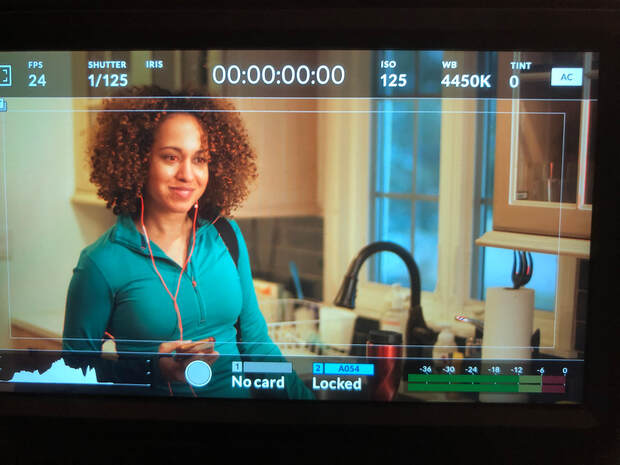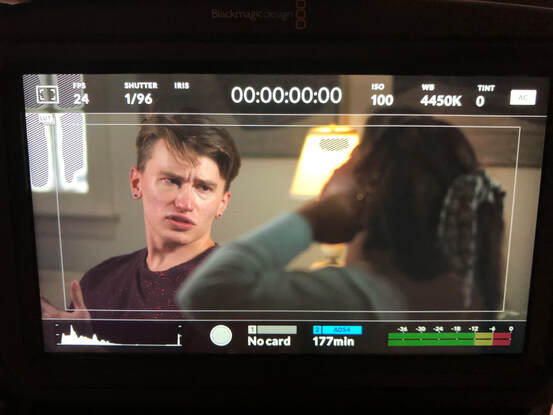|
By the end of this article, you'll know exactly how to memorize lines quickly, plus specific, actionable steps you can take to start booking more acting work right away.
No fluff in this guide, just real, actionable advice. Ready to get started? Note: If you want to supercharge your memorization, check out The 5 Best Apps to Memorize Lines Fast. How to Memorize LinesDid you know that actors who don't stick to the sides as they're written tend not to book the role? It's true. Many directors and writers dislike when actors improvise without permission. The words are written as they are for a reason, and some casting directors automatically cut anyone who doesn't stick to the script (unless the casting call says improvisation is OK).
|
|
A tip from professional actress Beth Broderick (Sabrina the Teenage Witch): "I keep a legal pad (recycled paper of course) with me at all times. When I have lines to learn I write them out in cursive word for word. This increases my comprehension and helps my brain wire itself around the material. Younger folks can achieve the same results by retyping the scene(s) on their computer or tablet. Pay close attention to the lines that the other characters are saying; read them thoroughly. A true understanding of the scene as a whole will also makes learning lines easier because it will begin to have a flow." |
#4: The Recorder Method
Why it's effective: By hearing the lines over and over again (while you're doing different things and in different environments), they eventually get embedded in you.
How to use it: This is a great first step just to start getting the lines in your head. You don't need to have anything memorized yet to use The Recorder Method.
How it works:
There are some free and paid apps that let you replay a segment of audio over and over again. I highly recommend Rehearsal Pro. Even though the $20 price tag might seem high for an app, keep in mind that most people spend more than that on a pair of jeans. Is booking more acting work worth a pair of jeans?
How to use it: This is a great first step just to start getting the lines in your head. You don't need to have anything memorized yet to use The Recorder Method.
How it works:
- Using your smartphone, record yourself saying all the lines from the scene. Be sure to record your own lines in a low whisper, and all the other lines in your normal voice. The effect of whispering your own lines ensures your lines are there in case you forget them, forces you to leave enough space in-between each line for you to say yours, and also ensures you don't keep hearing yourself perform the lines the same way (which can make you less receptive to direction during the audition).
- Play the recording back on repeat. Keep playing and listening to the scene, over and over again. When possible, say your lines out loud. Listen while doing other things and in different environments.
- Keep going until you have the scene down cold. It will likely take a couple of hours of work, spaced out over a day or two (depending on the length of the script).
There are some free and paid apps that let you replay a segment of audio over and over again. I highly recommend Rehearsal Pro. Even though the $20 price tag might seem high for an app, keep in mind that most people spend more than that on a pair of jeans. Is booking more acting work worth a pair of jeans?
#5: The Variance Method
Why it's effective: By performing your lines in all different ways, you strengthen the neural pathways to your brain AND you break your pattern of saying the lines in the same way. This helps you perform more naturally in the audition room.
How to use it: You can use this method (with or without the script in front of you) to really solidify your lines so you don't forget them – no matter what situation you're in – at least for the next few days. It works best if you have a live reader to practice with.
How it works:
What I love about this strategy is how fun it is. Playing your lines in all sorts of ways helps your brain really internalize them. Each time you do the scene, not only is it an enjoyable and different experience, but you're consistently strengthening your memory of the lines, and you're opening up your creativity to be able to play the scene in almost any way, making yourself more open to taking direction during the audition.
How to use it: You can use this method (with or without the script in front of you) to really solidify your lines so you don't forget them – no matter what situation you're in – at least for the next few days. It works best if you have a live reader to practice with.
How it works:
- Once you've got your lines memorized using the first three techniques, begin performing in wildly different ways. Try one where you perform your lines extremely fast. Go as quickly as you possibly can through the script.
- Next, perform really slow. Do the scene in an extremely slow-motion, bored type of way.
- Next, yell at the top of your lungs. Try screaming your lines as though you're enraged!
- Play it super sad and remorseful. Go the exact opposite by almost crying while saying your lines.
- Change it up even more! Do it any way you can, except the normal way you'd expect to do it. You can even try singing your lines!
What I love about this strategy is how fun it is. Playing your lines in all sorts of ways helps your brain really internalize them. Each time you do the scene, not only is it an enjoyable and different experience, but you're consistently strengthening your memory of the lines, and you're opening up your creativity to be able to play the scene in almost any way, making yourself more open to taking direction during the audition.
A Few Other Ways to Memorize Lines
If the strategies above were not enough, here are some other tactics you can use to memorize lines:
The Mini-Quiz Method
Why it's effective: By covering up your lines and attempting to remember each one, you're forcing yourself to create stronger neural pathways that will increase your learning.
How to use it: Try this if none of the aforementioned strategies on how to memorize lines work.
How it works:
Although it's probably one of the most boring methods, it works for many actors and you might as well give it a try if you're struggling with memorization.
How to use it: Try this if none of the aforementioned strategies on how to memorize lines work.
How it works:
- Print your script out and find an extra sheet of blank paper. You're going to be using the extra sheet of paper to cover up whatever line you're trying to memorize.
- Go down the script, line by line, covering up whichever line you're working on. Don't cover up the cue line (the line that comes before yours). Simply try to remember and say the line while it's covered up, as though you're quizzing yourself on each line.
- You can also try note cards. You can write your own lines on one side and the cue lines on the other side, and then read the cue line and try to remember your own.
Although it's probably one of the most boring methods, it works for many actors and you might as well give it a try if you're struggling with memorization.
The Exaggeration Method
Why it's effective: By exaggerating the transitions between lines, you can more easily stay on track throughout the scene.
How to use it: You can use this at the very beginning stages of memorization, just to initially get the lines down. But you definitely don't want to use it towards the end of the memorization process because it can negatively impact your performance.
How it works:
By over-exaggerating the feeling of the words in your mouth, your brain will automatically get used to the transition and it will be much harder to lose track of where you are.
You can use this strategy to solidify your memorization, but keep in mind that doing it too close to the audition can wind up influencing your performance because you might wind up accidentally over-exaggerating the way you say the words in the audition room, which would be embarrassing!
How to use it: You can use this at the very beginning stages of memorization, just to initially get the lines down. But you definitely don't want to use it towards the end of the memorization process because it can negatively impact your performance.
How it works:
- Go through the script, and every time there is a new line or new thought, highlight it. For example, if your line is, "I went to the mall, and then I bought some shoes. After that I went to the beach," you can highlight the transition between each new thought. You would highlight "mall, and," and "shoes. After."
- Next, over-exaggerate the highlighted segments. Say the words ridiculously exaggerated – for instance, with the first segment of "mall, and" you would say "MAAALLLL AAAAND" over and over again. Then you move onto the next transition, "shoes. After" which would sound like, "SHOOOOEESS AAAAFTER".
- You'll do this multiple times for each transition, getting used to the way your mouth feels saying the words. Finally, when you go through the entire script, the transitions will come naturally and keep you on track!
By over-exaggerating the feeling of the words in your mouth, your brain will automatically get used to the transition and it will be much harder to lose track of where you are.
You can use this strategy to solidify your memorization, but keep in mind that doing it too close to the audition can wind up influencing your performance because you might wind up accidentally over-exaggerating the way you say the words in the audition room, which would be embarrassing!
The Highlighter Method
Why it's effective: If you're a visual person, highlighting the hard-to-remember segments in different colors can help you remember your lines simply because you'll be able to visualize the colors and words beneath them.
How to use it: This should be used towards the end of the memorization process on the hardest-to-remember segments. Keep in mind that only some people are visually oriented though, so it might not work for you.
How it works:
Breaking up your script with different colors is an easy way to get your brain to wrap itself around your lines, and you can easily add this method to any of the other methods already discussed.
How to use it: This should be used towards the end of the memorization process on the hardest-to-remember segments. Keep in mind that only some people are visually oriented though, so it might not work for you.
How it works:
- Take note of the hardest-to-remember segments of the script. As you begin working on memorization (using the other techniques outlined in this article), you might notice that you have trouble with certain parts of the script.
- Use different color highlighters to section out those hard-to-remember segments. Don't do this until you've already gone through the script a few times and you're taking note of the segments that are hardest to remember. By highlighting them in different colors, your brain will pay extra attention to them and you'll change those hard-to-remember parts into hard-to-forget parts!
Breaking up your script with different colors is an easy way to get your brain to wrap itself around your lines, and you can easily add this method to any of the other methods already discussed.
My 5-Step Process to Memorize Lines FAST
Now that we've covered a wide array of methods to memorize lines, I want to finish up by outlining a simple, step by step process you can use to fully memorize your lines without too much effort.
It's an easy-to-follow process you can use over and over again and customize as needed. Feel free to mix in any apps for memorizing lines if you want as well. Enjoy!
Step 1: Use The Comprehension Method
To start out, you need to have a complete understanding of the scene. Read through the script, asking yourself what every line means (and Googling certain phrases if you don't understand them).
Once you have a full understanding of all the lines, it's time to make choices. Why would the character say this? What's the backstory or relationship to whoever they're talking to?
Once you make all these choices, it will be WAY easier to begin the memorization process.
Once you have a full understanding of all the lines, it's time to make choices. Why would the character say this? What's the backstory or relationship to whoever they're talking to?
Once you make all these choices, it will be WAY easier to begin the memorization process.
|
A tip from acting coach Kurt Yue: "Always remember that auditioning is not a memorization contest. The person who memorized all of the lines word for word is not guaranteed to get the job. I've booked numerous jobs where I said a line or two incorrectly in the audition. The more important thing is to focus on your character's objective. If that comes through in your audition, they won't care if you said a line wrong." |
Step 2: Use The Recorder Method
Now that you understand the scene, record the lines into your smartphone with an app, making sure to whisper your own lines but say the cue lines out loud.
Then, get your headphones out and start listening. You should have the scene play on repeat for at least an hour or two while you do other things so you start getting it in your head. When possible, say your own lines out loud.
Then, get your headphones out and start listening. You should have the scene play on repeat for at least an hour or two while you do other things so you start getting it in your head. When possible, say your own lines out loud.
|
A tip from acting teacher and coach Shorey Walker: Actors need to be familiar with the entire script. The instinct is to just memorize YOUR character's lines, but your character will be fuller and more compassionate if you understand and read EVERYTHING in the script. |
Step 3: Use The Letter Method or The Handwriting Method
Now it's time to start quizzing yourself to see whether you've got the lines down yet. Write out the first letter of every word, making sure to use the exact punctuation and capitalization as written in the script.
See if you've got the scene memorized by just looking at the letters as you rehearse. Only check the actual script if you can't remember a word.
This should be pretty easy by this point, and pretty soon you'll be able to do the entire scene without checking your letters at all!
See if you've got the scene memorized by just looking at the letters as you rehearse. Only check the actual script if you can't remember a word.
This should be pretty easy by this point, and pretty soon you'll be able to do the entire scene without checking your letters at all!
Step 4: Use The Variance Method
Now that you've got the scene down, it's time to lock it in your head. Run through the lines in all different ways. Fast, slow, angry, sad, comical, etc. Have fun with it!
Do this at least 4-5 times/ways.
Do this at least 4-5 times/ways.
Step 5: Use Spatial Repetition to Lock in Your Lines
Finally, it's time for a break. You need to give your brain some time to relax and solidify the neural connections, so take a bit of time away (at least 1 hour). Go for a light jog or take a nap.
Then, come back and repeat the process, starting with Step 2, 3 or 4, depending on how much of the script you can remember on your own.
Take another break, this time for at least 3-4 hours, and then go through the process again. By now, the lines should be well established in your mind, and you're unlikely to forget them.
At this point, any further rehearsing you do should simply be to get clearer on the character, and you won't need to worry about using The Variance Method anymore – just do the lines as you would in the actual audition, ideally using one of your reading buddies to practice.
Congratulations! You've memorized your script and are ready for the audition!
Then, come back and repeat the process, starting with Step 2, 3 or 4, depending on how much of the script you can remember on your own.
Take another break, this time for at least 3-4 hours, and then go through the process again. By now, the lines should be well established in your mind, and you're unlikely to forget them.
At this point, any further rehearsing you do should simply be to get clearer on the character, and you won't need to worry about using The Variance Method anymore – just do the lines as you would in the actual audition, ideally using one of your reading buddies to practice.
Congratulations! You've memorized your script and are ready for the audition!
WANT A TALENT AGENT TO GROW YOUR CAREER?
Knowing how to memorize lines fast is important, but it's just one small part of growing your acting career.
If you want to act full-time, your first major goal should be to get a legitimate, hardworking talent agent.
I highly recommend checking out this short podcast episode, where I share:
Listen in using the player below, and be sure to hit Subscribe (you can listen in on Spotify, Apple Podcasts, and more).
If you want to act full-time, your first major goal should be to get a legitimate, hardworking talent agent.
I highly recommend checking out this short podcast episode, where I share:
- The exact steps to getting a great, hardworking, and legitimate talent agent.
- How to shortcut the process significantly, especially for new actors.
- Tips to avoid scammers in the industry (there are a lot of them!)
Listen in using the player below, and be sure to hit Subscribe (you can listen in on Spotify, Apple Podcasts, and more).
|
Martin Bentsen (author of this guide) is an actor marketing coach who uses strategic thinking to help actors book more work. He’s helped over 14,000 actors with their careers and actor headshots since 2009 and his photography studio City Headshots is ranked #1 on Yelp. He’s spoken at NYU, The New England Theater Conference, The Actor’s Green Room, and other venues. Want to book more acting work by thinking strategically? Start with his free Actor’s Toolkit to create new opportunities right away, or visit his website at www.martinbentsen.com. |
Some Final Tips from Industry Experts
Alison Franck
Casting Director at Franck Casting
For theatre we assume a certain amount of memorization has taken place – especially if it's a callback and they've had quite a long period of time with the material. However, actors usually hold the sides to use as reference in case they forget a line or need a reminder.
I've seen actors completely off-book who don't hold the sides, but this often makes the creatives in the audition room concerned that they may get confused and call for a line like it's rehearsal. It's jarring at an audition. My advice – even if you're completely off-book, hold the sides.
Kids tend to be completely off-book & and in some cases it's because they can't read yet, but since most of the kids I audition are over 7 years old, it's because they think they have to be off-book. But the most damaging thing with that is kids also memorize how they will say the lines and when a director gives them any new direction, they can't break out of the rehearsed choices.
For commercial auditions, often the copy is short and can be memorized quickly and a cue card will be provided. But in most cases that copy isn't available until the day of the audition. For all of the actors who arrive that day, it's their first time seeing the copy, meaning everyone is in the same boat. Some people just memorize faster than others and in cases like this when the copy is last minute... actors who are quick to memorize may indeed have the upper hand.
I've seen actors completely off-book who don't hold the sides, but this often makes the creatives in the audition room concerned that they may get confused and call for a line like it's rehearsal. It's jarring at an audition. My advice – even if you're completely off-book, hold the sides.
Kids tend to be completely off-book & and in some cases it's because they can't read yet, but since most of the kids I audition are over 7 years old, it's because they think they have to be off-book. But the most damaging thing with that is kids also memorize how they will say the lines and when a director gives them any new direction, they can't break out of the rehearsed choices.
For commercial auditions, often the copy is short and can be memorized quickly and a cue card will be provided. But in most cases that copy isn't available until the day of the audition. For all of the actors who arrive that day, it's their first time seeing the copy, meaning everyone is in the same boat. Some people just memorize faster than others and in cases like this when the copy is last minute... actors who are quick to memorize may indeed have the upper hand.
Mari Lyn Henry
Veteran Casting Director and Co-Author of How to Be a Working Actor
You have to be without distractions, totally focused, and connected with the material. To be "off book" takes time and discipline.
Take the time to review the material silently. Read the monologue over and over at least five times. Look for the emotional beats in the piece. Mark each of them into moments or transitions. Work on total comprehension of the character, the motivations, the relationship with other characters. Find the truth and honor the integrity of the author.
Do not push for emotion when you are practicing, let it come naturally and without histrionics [overly theatrical or melodramatic moments]. From there you'll have a foundation from which to perform the piece and be in control.
Think of your monologue as your fingerprint – a part of your DNA. That is how connected it should be to you. Nerves and self-consciousness will cause you to go "up" during the piece. Use some relaxation exercises and breathe. Have another person cue you in a scene during rehearsal or tape record it.
Take the time to review the material silently. Read the monologue over and over at least five times. Look for the emotional beats in the piece. Mark each of them into moments or transitions. Work on total comprehension of the character, the motivations, the relationship with other characters. Find the truth and honor the integrity of the author.
Do not push for emotion when you are practicing, let it come naturally and without histrionics [overly theatrical or melodramatic moments]. From there you'll have a foundation from which to perform the piece and be in control.
Think of your monologue as your fingerprint – a part of your DNA. That is how connected it should be to you. Nerves and self-consciousness will cause you to go "up" during the piece. Use some relaxation exercises and breathe. Have another person cue you in a scene during rehearsal or tape record it.
Further Reading
If you enjoyed this article I have a feeling you'll enjoy these:
Comments are closed.










